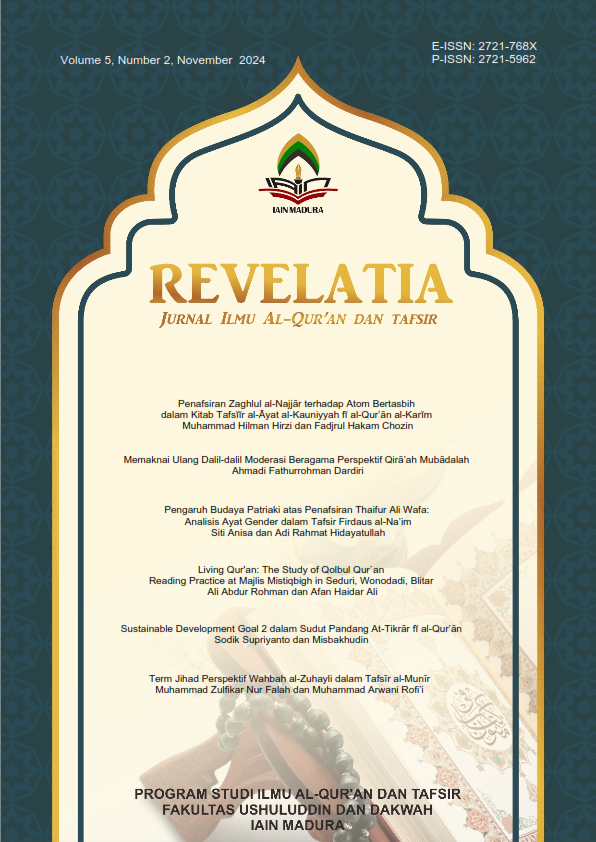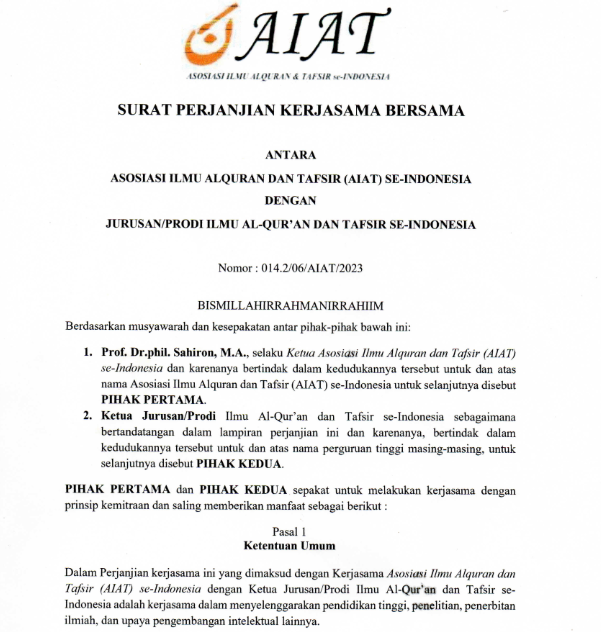The Sustainable Development Goal 2 Dalam Sudut Pandang At-Tikrār fĭ al-Qur’ān
 Abstract views: 147
,
Abstract views: 147
,
 PDF downloads: 82
PDF downloads: 82
Abstract
SDGs that have been introduced for many years, have several goals for humans. The repetition of the words eat and drink in the Qur’an may correlated with Sustainable Development Goal 2 which is Zero Hunger to eliminate hunger, to achieve food and nutrition retention, and improving sustainable agriculture. The Qur'an that has existed from revelation will always be relevant in every era with its each context. The Qur'an will always be a guidence for every challenge of the changing times. The repetition of the word (tikrār) kulū wasyrabū in the Qur'an has a lot of wisdom and lot of teachings to be learned. The Interpretation of Tikrār of word kulū wasyrabū raises several concepts and values that could help the understanding of the context of sustainable food needs. This is a qualitative and library research with its primary and secondary data and delivered in a descriptive narration which explains the goals of Sustainable Development Goal 2: No Hunger, and explains the tikrār verses in the Qur'an, explains concepts, values and its implementation in everyday life to provide a great opportunity in realizing the zero hunger goal.
Downloads
References
Afshin, Ashkan et al., “Health Effects of Dietary Risks in 195 Countries, 1990–2017: A Systematic Analysis for the Global Burden of Disease Study 2017,” The Lancet, no. 393 (May 11, 2019): 1958–1972.
Amalia, I., Riandi, R., & Surtikanti, H. K. “Kajian Literature: Penerapan Project Based Learning terkait Tujuan Pembangunan Berkelanjutan Poin 2 untuk Meningkatkan Kemampuan Berpikir Kreatif dan Kolaborasi Siswa”. Jurnal Jeumpa 11, no 1 (Mey 1, 2024), 63-74.
Bāqī (al)Muhammad Fu’ād Abd, al-Mu’jam al-Mufahros li Alfāẓ al-Qur’ān, Mesir: Dār al-Kutub al-Miṣriyah, 2009 .
Dasmarianti, “Kaidah Al- Tikrār dalam Al-Qur’an,” Tafasir 1, no. 1 (Juni 1, 2023), 81.
Departement of Economic and Social Affairs United Nations, “Targets and Indicators”, https://sdgs.un.org/goals/goal2#targets_and_indicators. accessed 25 Auguts 2024
Hayati, Cucu Nur, “Analisis Pengulangan Ayat Dalam Surat Inna Fi Żālika La Āyah Wamā Kāna Akṡaruhum Mu’minīn Dalam Surat Al-Syu’arā,” dalam Tikrār Ayat Fa Bi Ayyi Alā I Rabbikumā Tukażżibān Dalam Surat Ar-Rahmān (Studi Komparatif Tafsir al-Nuur dan Tafsir al-Munir), Khofifah Djunaidi (25 Juli 2022), https://digilib.uinsa.ac.id/56110/4/Khofifah%20Djunaidi_E73218043%20OK.pdf: 33.
Ishaq, Abdullah bin Muhammad bin Abdurahman, Lubābut Tafsīr Min Ibni Katsīr, Jilid 3 , Bogor: Pustaka Imam asy-Syafi’i, 2003.
Khoirul Umam, Labibah Dian Umami, and Nabila Roghba Sa’dati, “Islamisasi Konsep Sustainable Development Goals 2 : Zero Hunger,” INNOVATIVE: Journal Of Social Science Research 3, no. 5 (November 16, 2023): 10804–10820.
Pangestu, F. P., Rahmadianti, N. S., Hardiyanti, N. T., & Yusida, E. “Ekonomi Pancasila Sebagai Pedoman Dalam Tujuan Pembangunan Berkelanjutan SDGs (Sustainable Development Goals) 2030”. In Prosiding Seminar Nasional Ekonomi Pembangunan 1, no. 3, (June 1, 2021), 210-219
Sabt (al), Khalid ibn ’Utsman, Qawāid Al-Tafsir Jam’an Wa Dirāsatan, Kairo: Dār Ibn Affan, 2000.
Saputri, Widya, Wahyu Andryan, and Khodijah Ismail, “Pembangunan Berkelanjutan Sdgs 2030; Zero Hunger (Goal2), Widya Saputri, Juni 2021, https://www.researchgate.net/publication/352213433_Kelompok_2-_PEMBANGUNAN_BERKELANJUTAN_SDGs_2030_Zero_Hunger_Goal2-Pertemuan_10, accessed 24 August 2024.
Selvitri dkk, “Pembangunan Berkelanjutan Tujuan 2 : Mencapai Nol Kelaparan.” Sevitri, Juni 2021, https://www.researchgate.net/publication/352568494_PEMBANGUNAN_BERKELANJUTAN_TUJUAN_2_MENCAPAI_NOL_KELAPARAN, accessed 25 August 2024.
Shiddieqy (al), Hasbi, Tafsir Al-Qur’anul Majid An-Nuur Jilid 5, Semarang: Pustaka Rizki Putra, 2000.
Shihab, M. Quraish, Tafsir Al-Mishbah: Pesan, Kesan, Dan Keserasian Al-Quran Surah Al-Fatihah-Surah Al-Baqarah, Tafsir Al-Misbah Jilid 1, Jakarta: Lentera Hati, 2002.
Sporchia, Fabio et al., “Zero Hunger: Future Challenges and the Way Forward towards the Achievement of Sustainable Development Goal 2,” Sustainable Earth Reviews 7, no. 10 (April 1, 2024): 2-6.
Supriyanto, Sodik, Tikrār Dalam Al- Qur’an (Analisis Pengulangan Kata Kulū Wasyrabū Dalam Al- Qur’an), Sodik Supriyanto, 19 April 2024, http://etheses.uingusdur.ac.id/8056/1/3120039_Cover%2C%20Bab%20I%20dan%20Bab%20V.pdf, diakses pada 2 Juli 2024.
Suyuti (al), Jalaluddin, Al-Itqan Fi Ulum Al-Qur’an, jilid 3, Kairo: Dār al Fikr, 2008.
Syukran, Agus Salim, “Fungsi Al-Qur’an Bagi Manusia,” Al-I’jaz : Jurnal Studi Al-Qur’an, Falsafah Dan Keislaman 1, no. 2 (Desember 1, 2019): 106–107.
Tanjung, Alwin, “Keistimewaan Tikrar Al-Qur’an,” Al-Kauniyah 3, no. 2 (Januari 19, 2023), 120.
Thabari (al), Abu Ja’far Muhammad Jarir, Tafsir Al-Qur’an Thabari Terj. Adul Razzik Al Bakri dkk. Jilid 1, Jakarta : Pustaka Azzam, 2009.
Wakefield, Benjamin et al., “Facilitating Progress towards SDG2: Zero Hunger,” Benjamin Wakefield, 15 Feb 2022 , https://policycommons.net/artifacts/2256720/facilitating-progress-towards-sdg2/3015426/, accesed 24 August 2024
Wepo, “Pola Konsumsi dalam Islam: Perspektif Al-Qur’an tentang Kebijakan Konsumsi yang Berkelanjutan”, Wepo, 2 Agustus 2023, https://an-nur.ac.id/esy/pola-konsumsi-dalam-islam-perspektif-al-quran-tentang-kebijakan-konsumsi-yang-berkelanjutan.html, accessed 1 Juli 2024.
Wiranto, Agung, “Konsep Pembangunan Berkelanjutan Dalam Al-Qur’an”, Agung Wiranto, 7 Desember 2018, https://bincangsyariah.com/kolom/konsep-sustainable-development-dalam-alquran/ , diakses pada 1 Juli 2024.
Zarkasyi (al), Muhammad bin Abdillah, Al-Burhān Fi Ulum Al-Quran, Jilid 3, Kairo: Dār al-Turas, 2007.
Zuhaili (al), Wahbah, Tafsīr Al-Munīr, ed. Dkk Penerjemah: Abdul Hayyie al Kattani, 1st ed. ,Jakarta: Gema Inssani, 2003.
The journal operates an Open Access policy under a Creative Commons Non-Commercial Share-Alike license. All articles published Open Access will be immediately and permanently free for everyone to read and download.
• Creative Commons Attribution-NonCommercial (CC-BY-NC)

Revelatia: Jurnal Ilmu al-Qur`an and Tafsir by http://ejournal.iainmadura.ac.id/index.php/revelatia is licensed under a Creative Commons Attribution-NonCommercial 4.0 International License.
Based on a work at http://ejournal.iainmadura.ac.id.





















